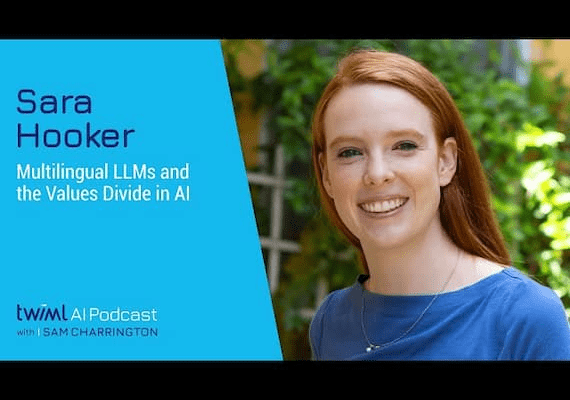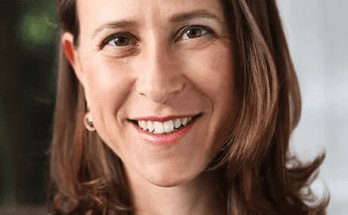Who is Sara Hooker?
Sara Hooker is a computer scientist specializing in artificial intelligence (AI). She is known for her work on model efficiency at scale, large language models, and research on algorithmic bias and fairness in machine learning. As Vice President (VP) of Research at Cohere, she launched the Cohere For AI Scholars program. Her research and contributions have made significant impacts on AI, particularly in making it more efficient and accessible.
Sara Hooker Biography
Sara Hooker was born in Dublin, Ireland. At four years old, her parents moved to Lesotho. She grew up in South Africa, Mozambique, Lesotho, Eswatini, and Kenya until she was 19. Her diverse upbringing played a crucial role in shaping her worldview and career in AI research.
Sara Hooker Age
As of 2025, Sara Hooker’s exact age is not widely documented, but she is a recognized leader in AI research with years of experience in the field.
Sara Hooker Height
Information regarding Sara Hooker’s height is not publicly available.
Sara Hooker Education
Hooker holds an impressive academic background in computer science and economics. She earned a Doctor of Philosophy in Computer Science from Mila – Quebec AI Institute. She also has a bachelor’s degree from Carleton College with a dual major in Economics and International Relations, as well as an Economics degree from the Fundação Getulio Vargas. Additionally, she has an International Baccalaureate (IB) Diploma from the Waterford Kamhlaba United World College.
Sara Hooker Parents and Siblings
Hooker was born into a supportive family, but detailed information about her parents and siblings is not widely available in the public domain. Her family’s move across multiple African countries during her childhood exposed her to different cultures and learning experiences, shaping her interest in global AI development.
Sara Hooker Husband and Kids
There is limited publicly available information regarding Sara Hooker’s marital status, husband, or children. She maintains a private personal life while focusing on her career in AI research.
Sara Hooker Career
Hooker has built an impressive career in artificial intelligence and machine learning. In 2014, she founded Delta Analytics, an organization dedicated to developing technical capacity for non-profits.
In 2017, she joined Google Brain as a research scientist, working on interpretability and efficiency at scale. She was part of the original research team that helped establish Google’s Ghana engineering office, furthering AI development in Africa.
In April 2022, she joined Cohere as VP of Research, leading the Cohere For AI initiative. Under her leadership, the lab has released projects such as Aya, which aims to increase multilingual AI coverage. She also launched a grant program to bridge the resource gap in AI research.
Key Achievements:
- Former AI researcher at Google Brain, focusing on model interpretability and efficiency.
- VP of Research at Cohere, leading Cohere For AI.
- Founded Delta Analytics to support non-profits with technical expertise.
- Recognized as one of AI’s top 13 innovators by Fortune in 2023.
- Named in TIME’s 2024 list of the most influential people in AI.
- Serves on Kaggle’s ML Advisory Research Board and the World Economic Forum Council on the Future of Artificial Intelligence.
- Member of the MLC research group.
Sara Hooker Salary and Net Worth
While Sara Hooker’s exact salary is undisclosed, AI researchers at top institutions typically earn between $100,000 and $300,000 annually, depending on experience and roles. Her estimated net worth is believed to be in the range of $1 million to $5 million, based on her research contributions, speaking engagements, and leadership positions.
Sara Hooker Social Media
Hooker is active on various social media platforms, where she shares insights on AI research and engages with the tech community:
Twitter/X: @sarahookr
LinkedIn: Sara Hooker
Conclusion
Hooker is a trailblazing computer scientist making remarkable contributions to artificial intelligence. Her expertise in deep learning, model efficiency, and AI fairness has positioned her as a leading researcher in the field. With her ongoing work at Cohere For AI, she continues to shape the future of AI research and accessibility.
Leah Awuor is a seasoned content creator and digital storyteller with a passion for crafting narratives that inform, inspire, and engage. With a wealth of experience profiling media personalities, politicians, celebrities, and emerging trends, Leah brings together sharp analytical insight and a natural talent for storytelling.
Her work is recognized for its accuracy, depth, and ability to spark meaningful conversations. As the creative force behind some of Fact-Pedia’s most-read articles, Leah consistently delivers high-impact content that resonates with diverse audiences across the globe.
Driven by curiosity and a commitment to editorial excellence, she covers everything from breaking news to in-depth celebrity profiles and cultural commentary. Leah’s ability to anticipate trends and deliver compelling stories makes her a trusted and influential voice in the digital media landscape.




